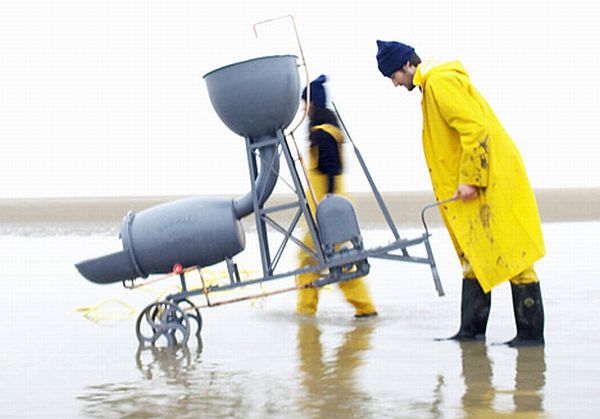
Innovation is said to be at work when we do something different and unique to benefit people and other life forms inhabiting our planet. Three people knew it well. Alexander Groves, Azusa Murakami and Kieren Jones, all graduates of the Royal College of Arts in London have turned a fishing trawler on its head and made a sea cleaning machine by searching the plastic waste, which they lovingly call the Sea Chair, this being in a chair like structure. So, watch out all you plastic in the sea, the chair is coming to chuck you out.
What’s it about?
Well, people generally go for fishing in the sea, but the trio can proudly say that they go to fish plastic. And besides making the sea a better place for those marine inhabitants, they are also doing a great deal for the two legs land walker, the human. With growing population, logic dictates that one needs more chairs, and humans are known to pollute water bodies from time immemorial. So, why not combine the two and viola!, you have the Sea Chair.
Methodology:
You must be wondering, how’s this possible? Don’t fear. You shall get all your answers. The machine encompasses a fishing trawler with an on-board factory which sorts out the plastic pellets from the other denser elements. It uses a floatation tank which filters the debris. The chair scoops along the shore, picking up plastics hither and thither and all the junk goes in the tank which sits peacefully atop the machine.
The machine has been nominated for the Victorinox Time To Care Award. If you want to vote, then you can visit their site and make your vote count. The designers are hoping that they get the award, because this will make their machine a reality, and they can start production soon. Even if they end up in top three, they will get enough funding to start production. So, people make your vote count and pave the way for change. The plastic pellets are popularly known as ‘nurdles’ among the industrial community. The designers found that they were the most prevalent amongst the debris during their research trip to Porthtowan beach. Their minds ran this way: the plastic pellets are the raw materials for injection molding. Being small, they will not be scooped up by other ‘sea cleaning’ machines, and as they don’t make the pointer of the weight scale tilt away much, they will just float on the water surface. And according to the way nature works, take a thousand years to disintegrate. So, in an eureka moment, they decided to do something about it.
EU has also decided to pay the fishermen by plastic, so this will enable them to live a better life, as the net used to scoop plastic does not harm marine life, and the plastic can be recycled into a sea chair. So, do cast your vote, and let’s walk along the road to a better world.
Via: Dezeen




